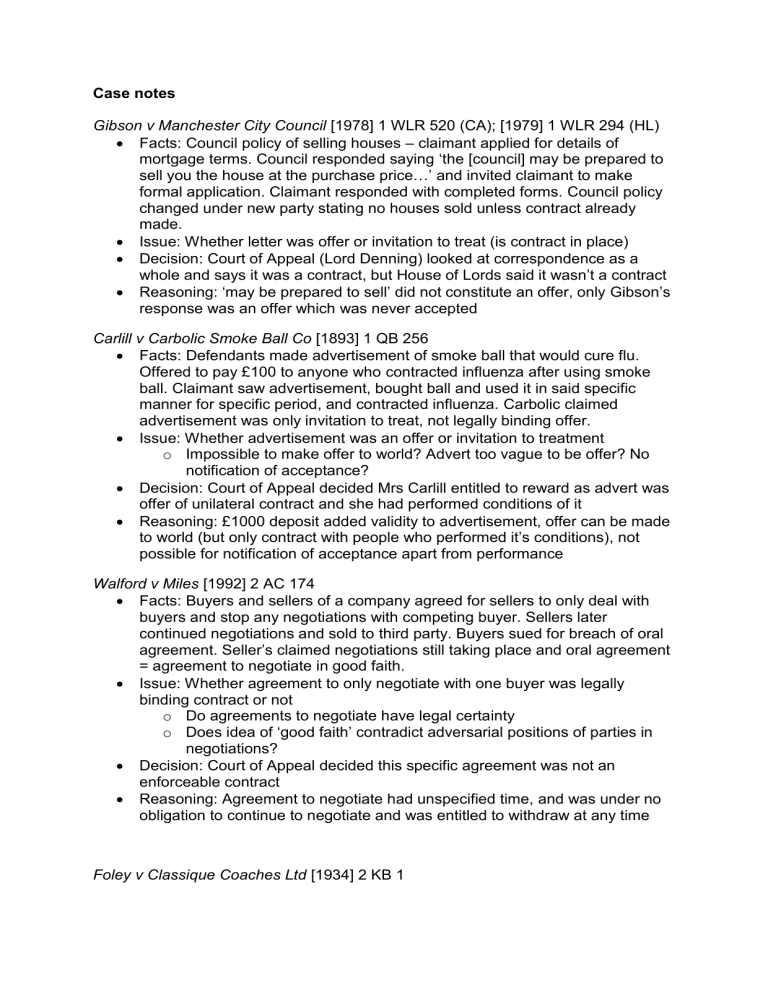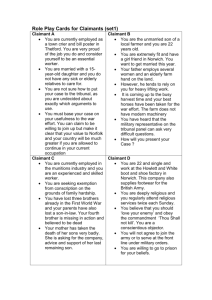
Case notes Gibson v Manchester City Council [1978] 1 WLR 520 (CA); [1979] 1 WLR 294 (HL) Facts: Council policy of selling houses – claimant applied for details of mortgage terms. Council responded saying ‘the [council] may be prepared to sell you the house at the purchase price…’ and invited claimant to make formal application. Claimant responded with completed forms. Council policy changed under new party stating no houses sold unless contract already made. Issue: Whether letter was offer or invitation to treat (is contract in place) Decision: Court of Appeal (Lord Denning) looked at correspondence as a whole and says it was a contract, but House of Lords said it wasn’t a contract Reasoning: ‘may be prepared to sell’ did not constitute an offer, only Gibson’s response was an offer which was never accepted Carlill v Carbolic Smoke Ball Co [1893] 1 QB 256 Facts: Defendants made advertisement of smoke ball that would cure flu. Offered to pay £100 to anyone who contracted influenza after using smoke ball. Claimant saw advertisement, bought ball and used it in said specific manner for specific period, and contracted influenza. Carbolic claimed advertisement was only invitation to treat, not legally binding offer. Issue: Whether advertisement was an offer or invitation to treatment o Impossible to make offer to world? Advert too vague to be offer? No notification of acceptance? Decision: Court of Appeal decided Mrs Carlill entitled to reward as advert was offer of unilateral contract and she had performed conditions of it Reasoning: £1000 deposit added validity to advertisement, offer can be made to world (but only contract with people who performed it’s conditions), not possible for notification of acceptance apart from performance Walford v Miles [1992] 2 AC 174 Facts: Buyers and sellers of a company agreed for sellers to only deal with buyers and stop any negotiations with competing buyer. Sellers later continued negotiations and sold to third party. Buyers sued for breach of oral agreement. Seller’s claimed negotiations still taking place and oral agreement = agreement to negotiate in good faith. Issue: Whether agreement to only negotiate with one buyer was legally binding contract or not o Do agreements to negotiate have legal certainty o Does idea of ‘good faith’ contradict adversarial positions of parties in negotiations? Decision: Court of Appeal decided this specific agreement was not an enforceable contract Reasoning: Agreement to negotiate had unspecified time, and was under no obligation to continue to negotiate and was entitled to withdraw at any time Foley v Classique Coaches Ltd [1934] 2 KB 1 Facts: Foley agreed in writing to sell piece of land to Classique Coaches, on condition they purchase all petrol from him at price to be agreed ‘in writing and from time to time’ and no one else as long as Foley able to supply. 3 years later Classique Coaches claimed contract void due to uncertainty and stopped buying petrol from Foley – no agreed price of fuel and petrol clause was unreasonable restraint of trade. Issue: if no price quoted is the contract void Decision: Contract not void, Classique Coaches breached contract Reasoning: Defendant had performed obligations for 3 years and they could not repudiate this suddenly o When agreement made and obligations performed, it implied that the price under agreement was reasonable o Price agreement also included arbitration clause that would have been able to solve this type of dispute Byrne v Van Tienhoven (1880) 5 CPD 344 Facts: Defendant (Cardiff) wrote letter Oct 1 to claimant (New York) offering sale of tin plates, took 10-11 days to be delivered. Claimant received letter Oct 11, accepted same day by telegram and also by letter Oct 15. Defendant had sent letter Oct 8 withdrawing offer which arrived Oct 20. Claimant sued for damages for non-delivery of tin plates. Issue: Whether withdrawal of offer was acceptable Decision: Withdrawal not effective as contract had been created on Oct 11 when claimant accepted offer from Oct 1 letter Reasoning: Offer cannot be withdrawn by posting secondary letter that does not arrive until after first letter received and responded to New Zealand Shipping Co Ltd v AM Satterthwaite &Co Ltd (The Eurymedon) [1975] AC 155 Facts: Contractors unloading machinery from ship. Contract between machinery owners and carriers had limitation clause – no agent of carrier liable for damage unless action brought within one year. Ship unloaders damaged machinery, machinery owners brought action outside one year. Issue: Whether stevedores (unloaders) benefitted from time limit as agreement between carrier and owners o Contract between two parties sued on by third person Decision: Privy Council decided stevedores weren’t liable as they could rely on time limit clause Reasoning: Wording of clause covered all parties involved in carriage of goods


